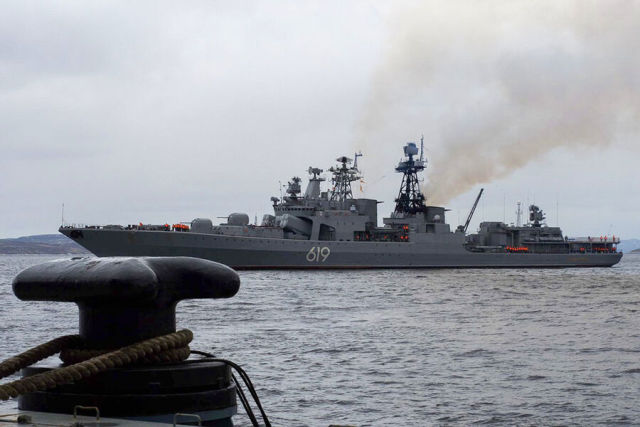Oslo associates this with the exhaustion of the Russian arsenal of surface-to-surface missiles For the first time in 30 years, ships of the Russian Northern Fleet began to go to sea with tactical nuclear weapons on board, according to the Norwegian Intelligence Service (NIS).
The report says that Russia has already used up three-quarters of its modern surface-to-surface missiles, which increases the role of nuclear weapons. The department's employees are also afraid of NATO expansion and Sweden joining the alliance, as this could involve Norway in a confrontation with Russia.
Nuclear threat
The annual report of the Norwegian Intelligence Service claims that "Russia has spent three-quarters of its modern surface-to-surface missiles in Ukraine. At the same time, it is noted that the Russian Federation still "has large stocks of military equipment, especially old types."
"On the other hand, Russia's nuclear potential remained at the same level as before the war, and the air force and naval forces were practically not affected. In 2023, the defense budget increases by 34 percent, which leads to further pressure on the rest of the Russian economy. The defense and security sector will now account for about a third of Russia's state budget. With the weakening of conventional capabilities, the importance of nuclear weapons for Russia has increased significantly," according to Norwegian intelligence data.
The document states that "the bulk of the nuclear forces are deployed on submarines and surface ships of the Northern Fleet." And for the first time since the Cold War, its ships began to go to sea with tactical nuclear weapons on board.
"Tactical nuclear weapons pose a particularly serious threat in several scenarios of operations in which NATO countries may participate. In addition, Russia has, among other things, underwater capabilities, anti-satellite weapons and cyber means that can threaten Norway and NATO," the authors of the report believe.
Norwegian intelligence officials also believe that Russia has a "strong distrust of the West" because of its reaction to the start of a military special operation in Ukraine.
"Both the likelihood of misunderstandings between Russia and NATO and unintended incidents are increasing, which, in turn, increases the risk of escalation," the report notes.
According to Norwegian intelligence officers, Russia will continue its offensive in Ukraine. And high-precision long-range weapons form the basis of the Russian strategy of "deterrence and waging war against NATO." The report says that Russia will be able to return the stocks of precision weapons "to the pre-war level within 5-10 years."
"As Russia recovers its arsenal of conventional high-precision long-range weapons, non-strategic nuclear weapons will play a more prominent role in Russia's regional defense," the document states.
Norwegian intelligence believes that if Russia "faces serious economic problems while restoring its conventional military power," then "the threshold for nuclear escalation will be lower - including in nearby Norwegian areas."
The struggle for the Arctic
Norwegian intelligence experts are confident that "the invasion of Ukraine provoked a prolonged confrontation between Russia and NATO," which extends "to all sectors and geographical areas where the interests of Russia and allies collide." The authors of the report believe that the confrontation also affected the Arctic and the Baltic Sea region.
"The Arctic is becoming an arena of rivalry between great powers. The war in Ukraine has increased Russia's need to consolidate its security interests in the Arctic," the document says.
Intelligence officials suggested that Russia could designate "red lines" in the Arctic and would "respond more decisively to perceived threats."
"In general, the nearby Norwegian areas will be characterized by a constant conflict potential," NIS believes.
The danger of NATO expansion
Norwegian intelligence believes that the events of the last year have helped Oslo "more clearly understand the threat to Russia." Experts also fear "the impending expansion of NATO into the Scandinavian region." They believe that the expansion of the North Atlantic Alliance "will directly connect Norway with the Baltic Sea region - one of the most important theaters of Russia's military operations."
"With the membership of Sweden and Finland in NATO, Russia will attach greater importance to the maritime areas, territory and infrastructure of Norway," the report says.
The authors of the document are sure that the geopolitical value of Norway is connected not only with its geographical location, but also with the fact that Europe "in the foreseeable future depends on the supply of Norwegian energy resources."
"Russia is becoming an increasingly unpredictable neighbor for Norway In Moscow, Norway is viewed more as part of a Western aggressive collective and to a lesser extent as a neighboring country with which Russia's interests overlap," the NIS concluded.
Maria Shustrova

